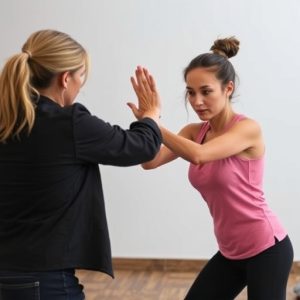Empowering Women: Comprehensive Self-Defense Strategies for Safety
Women's self-defense encompasses physical techniques, mental preparation, legal knowledge, and…….
Women's self-defense encompasses physical techniques, mental preparation, legal knowledge, and practical tools. Basic training teaches strikes, kicks, and blocks, while mental strategies focus on confidence and assertiveness through mindfulness and visualization. Understanding legal rights is crucial, with specific protections against gender-based violence. Practical tips include staying alert, carrying alarms or pepper spray, and learning basic self-defense moves. Support networks like classes, online resources, and women's groups provide expert guidance and safe practice environments. Mastering these strategies empowers women to protect themselves in diverse situations.
“Empower yourself with essential self-defense strategies tailored specifically for women’s unique needs. In today’s world, understanding your options extends beyond physical techniques. From mental preparedness and building confidence to legal rights awareness and practical everyday tools, this guide explores comprehensive approaches to personal safety.
Learn how to navigate potential threats, protect yourself legally, and find the right support network through specialized training and resources. Discover valuable tips and gain the knowledge to confidently assert yourself in any situation.”
Understanding Your Options: Physical Techniques for Women's Self-Defense
When considering self-defense strategies, women have a unique set of physical techniques at their disposal. It’s essential to understand that self-defense isn’t just about strength; it’s about using your body effectively and strategically. Basic self-defense training teaches important moves like strikes, kicks, and blocks, which can help deter an attacker.
Beyond physical techniques, knowing how to use everyday objects as weapons is a valuable skill. This includes simple tools like keys, pens, or even a phone. Self-defense for women tips often emphasize the power of surprise and distraction, teaching individuals to make loud noises, scream, or use their voice assertively to startle an assailant. Combining these physical and tactical skills can empower women to protect themselves effectively in various situations.
Mental Preparedness: Building Confidence and Assertiveness
Mental preparation is a powerful tool in any self-defense strategy, especially for women. Building confidence and assertiveness starts from within. It involves recognizing your inherent strength and capabilities, challenging societal stereotypes that undermine women’s power, and adopting a mindset of resilience and self-worth. This inner transformation encourages women to stand tall, project confidence, and be assertive in potentially dangerous situations—a crucial first step in deterring potential attackers.
Women can enhance their mental preparedness through various methods: practicing mindfulness to stay alert and focused, visualizing positive outcomes, and engaging in regular self-care routines that promote mental well-being. Such practices not only boost overall confidence but also equip women with the mental fortitude to make quick decisions under pressure, should they ever find themselves in a self-defense situation.
Legal Rights and Awareness: Protecting Yourself Against Misuse
Understanding your legal rights is a crucial component of any effective self-defense strategy for women. In many places, women have specific protections and rights designed to safeguard them against gender-based violence and harassment. Familiarizing yourself with local laws and reporting procedures empowers you to take immediate action if you ever find yourself in a dangerous situation. Know the legal definitions of assault, harassment, and stalking, and remember that you have the right to protect yourself without fear of retaliation or legal consequences.
Awareness of these rights can transform your response to potential threats. Always carry emergency contact information and know how to access local support services. Documenting incidents through reports, photos, or witness statements can serve as evidence if further action is required. Educating yourself on the legal framework supporting self-defense tips for women enables you to stay calm, confident, and in control when facing challenging situations.
Practical Strategies: Everyday Tools for Personal Safety
In today’s world, empowering ourselves with practical self-defense strategies is more crucial than ever for women’s personal safety. Beyond martial arts or specialized training, there are everyday tools and techniques every woman can master to enhance her confidence and deter potential threats. One effective strategy is staying alert and aware of your surroundings; this includes developing a keen sense of observation, trusting your instincts, and recognizing suspicious behaviors. Carrying essential items like a personal alarm, pepper spray, or even a simple key chain can serve as powerful deterrents in high-risk situations.
Additionally, learning basic self-defense moves can provide invaluable confidence and control. Simple techniques such as breaking free from grips, using voice projection to attract attention, or employing elbow strikes and knee kicks can be life-saving. Practicing these skills regularly, even for just a few minutes daily, can make a significant difference in your ability to defend yourself effectively if needed. Embracing these practical strategies equips women with everyday tools to take charge of their safety and navigate potential dangers with increased peace of mind.
Training and Resources: Finding the Right Support Network
Finding the right support network is a crucial step in your journey towards mastering self-defense strategies. Look for reputable self-defense classes or workshops specifically tailored for women, where experienced instructors can provide valuable techniques and insights. These training sessions often cover a range of topics, from basic physical defenses to psychological strategies for stressful situations. Online resources are also abundant; many websites and apps offer video tutorials, self-assessment tools, and access to communities where you can share experiences and learn from others.
Remember that the key is to find a community that aligns with your learning style and comfort level. Consider joining local women’s groups or clubs focused on fitness and personal development, as they may offer opportunities to practice skills in a supportive environment. Additionally, seeking recommendations from trusted friends or family members who have also taken interest in self-defense can guide you towards proven resources and networks that cater to women’s unique needs, providing you with the best tips for self-defense.


